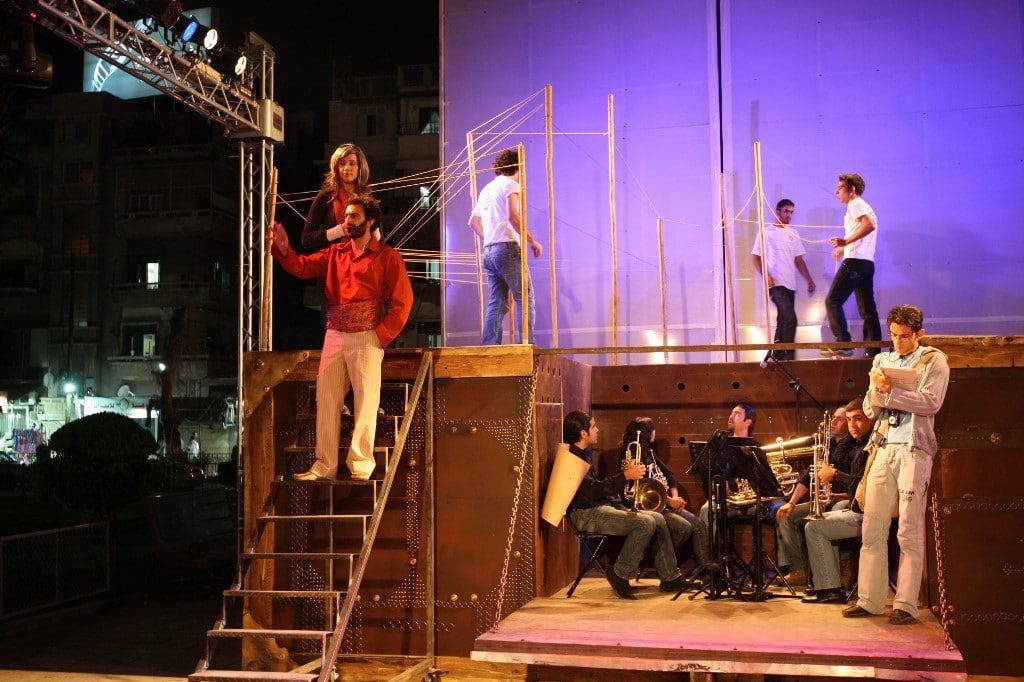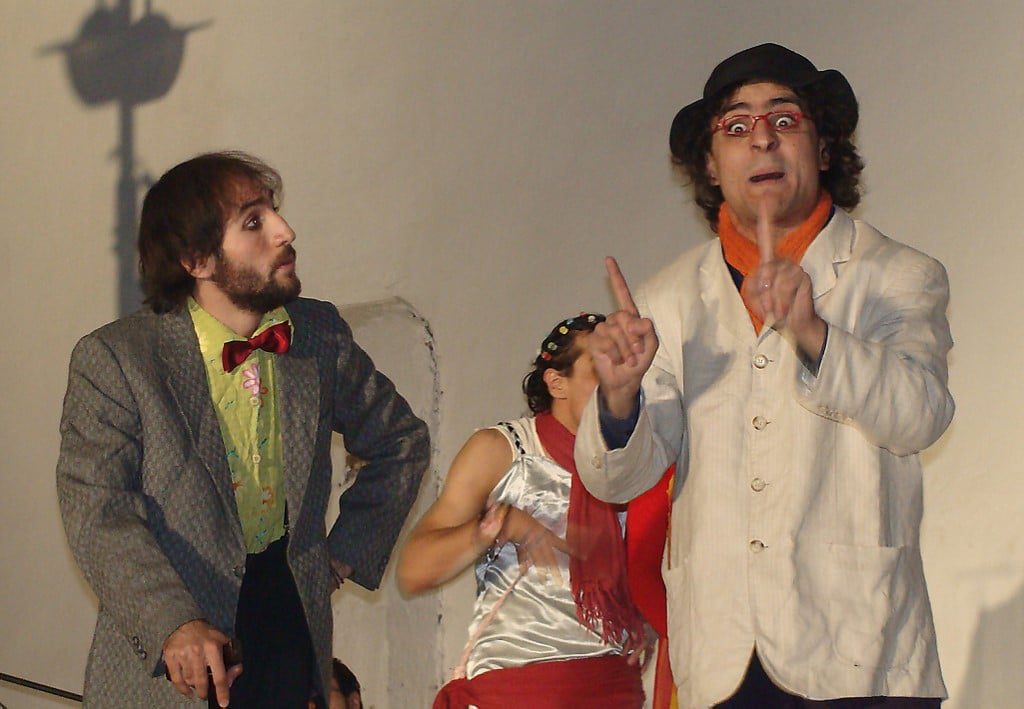
Youssef Sharqawi
Few documents reached us to shed the light on the story of how the reactionary fiercely opposed Abu Khalil Qabbani. His theatre was burned down. All things he spent years to make were destroyed. Even children were enticed to ridicule him and sing filthy songs to him. These kids used to shout: “Abu Khalil Qabbani, you better go back to your business.”
When Abu Khalil was twelve years, he earned his last name Qabbani (English: shop seller). At that age, he used to work for his uncle Abdullah al-Nashawati as a worker who operates a steelyard in the Damascene Bazar al-Buzuriyah. This uncle supported Abu Khalil when he was kicked out of his home.
Abu Khalil was not able to continue living in Damascus, because they burned his talent and his work. According to Playwright Saadallah Wannous, that was a murder. To make the work of an artist impossible, to make his stay in his home country impossible is something akin to murder. It might be worse than murder.
The assault on the founder of the Levantine school – he incorporated acting into singing and dancing – seems incomprehensible. During the second half of the 19th century, Abu Khalil’s texts hardly contained ideas that clash with the norms prevailing in his conservative traditional society.
The texts of Qabbani did not at all offend the authorities. On the contrary, he concluded all of his texts with songs glorifying the Sultan and praying for his good. Only one text did not contain such a song and he probably did that by mistake.
Dr. Shaker Mustafa supported this opinion in his book “History of Novel in Syria”. “The characters presented by Qabbani’s theater were nothing but characters of princes and kings”, Mustafa wrote, “the values and concepts he expressed were nothing but the values of the medieval feudal society that was still living in the shadow of the Ottoman Sultan.”
Then, why was Qabbani severely fought, and a “statement of proceeding” was filed against him by Sheikh “Saeed al-Ghabra” to Istanbul? The statement bore the signatures of most of Damascus’s notables to prevent Qabbani from organizing theatrical performances.
The statement’s text is mentioned in Kamel al-Khalei’s book “The Eastern Music”. It stated that “noble people in Syria disgust acting and consider it as a sin and a heavy burden. Ordinary people might watch scenes about lovers and the pleasure they find in reuniting after separation.”
Ibrahim Keilani quoted some phrases from Sheikh Saeed Al-Ghabra’s appeal to the Sultan: “Save us, Amir al-Mu’minin! Immorality and lewdness have spread in the Levant. Honor is disgraced. Virtue died. Women have mingled with men!”
Some scholars attributed the reactionary anger to moral reasons. The sheikhs were incensed by the love scenes and dialogues in Qabbani’s stories. However, the “Karakouz tent” was widely spread in Damascus back then. When Midhat Pasha was appointed as the wali of the city, he toured to inspect its conditions. The new wali’s attention was drawn to a large number of cafes in which the tales of the “Karakouz tent” were used to be acted. As a result, he criticized the dignitaries of Damascus at this depraved level and blamed them for their desire to watch these shameful scenes. That turns us back to the following question: Why was the statement raised only against Qabbani?

Ibrahim Keilani adds: “With his instinctive kindness, Abu Khalil Qabbani was alerted to the danger threatening his artistic movement while it was still in its cradle. He deliberately appeased the reactionary domineering leaders and shared profits with them. However, it appears that the share of one of them – who was Sheikh Saeed Al-Ghabra that bullied the minds of common people with his tongue – was insignificant. After his resourcefulness failed to fight Qabbani at home, Al-Ghabra traveled to Istanbul, the capital of the caliphate.”
However, this reason only won’t suffice, as there are around 29 signatures of Damascus notables on the statement. In his book “History of the Eastern Music”, Qostandi Rizk mentions the reason favored by the Syrian playwright “Saadallah Wannous”. Rizk says: “When Qabbani’s troupe started performing Abu al-Hassan al-Mughaffal’s story, some of the reactionary sheikhs were shocked for the appearance of Harun al-Rashid on stage, in the form of Abu al-Hasan al-Mughaffal. They raised an appeal accordingly to the Ottoman government in Istanbul. As a result, a Shahani decree was issued to prohibit Arab Acting in Syria.”
Also, the work of Abu Khalil Qabbani was considered “heresy”, as sheikh Jamil al-Shatti stated in his book “Notables of Damascus in the Fourteenth Century”. At that time, sheikh Saeed al-Ghabra traveled to Istanbul “to remove and nullify many of those heresies that appeared in Damascus, especially acting novels that damaged morals and money, and its founder and the banner bearer was Abu Khalil Qabbani.”
Wannous identifies the risk factors that clerics felt in Qabbani’s experience as being in the theatrical phenomenon. According to him, these factors were three: first, the emergence of the theater was part of the enlightenment and the renaissance movement. The second factor is related to the social nature of the theatrical phenomenon, while the third factor is related to “impersonification” which is the most dangerous element in the theatrical phenomenon. At that time, religious feudal systems used to employ various means to confirm and perpetuate the strict boundaries between classes. There used to be a “vertical space” where these systems succeeded in putting themselves high above the people. That is why they sensed the danger of impersonification. The church had discovered its danger before the Islamic clergy when it resisted the Commedia dell’arte troupes in Italy. After all, impersonification removes the sanctity aura from the nobles, dragging them from their high ranks to being normal people present among spectators. The slip of an actor might make a king look foolish. In the same way, a prince might look ridiculous. when spectators laugh, the wall of fear deep inside them crumbles. At that moment, questions come in turn.
The Damascene audience was not against Qabbani. As Muhammad Kurd Ali mentioned in his book “Description of Syria”, the Damascene audience “was not surprised by this bold artwork – the play of “King Waddah” – as much as they admired this local comedy, presented to them by an inveterate Muslim.”
Spontaneousness and improvisation were played to the maximum level in Qabbani’s shows. According to Wannous, the actor’s performance played a significant role in stripping those who stood at the top of the social pyramid, or in tearing the masks of sanctity and dread from their faces. Kings, ministers, and princes were losing their sublime connotations through imitation.
Therefore, the clerics were incited when Harun al-Rashid appeared on stage. Moreover, they also accused the Qabbani experience of being a heresy.
The pioneer of the Syrian theater lived his life among wars being waged against him and the rejections he was subjected to. After his theater was burned in Khan al-Jumruk in Damascus, he traveled to Egypt and then to Beirut. In Istanbul, he applied to the office of the Grand Vizier to grant him a residence permit for “Teatro” (theater) to present his plays in Arabic.
The request was rejected. As a result, Qabbani returned to Cairo and then to Damascus in 1890. He appeared in Beirut in 1892 with a large troupe that he formed, and its name was The Theater of Eastern Customs. He prepared to go to Chicago to participate in its international exhibition. However, he was even not left alone there. Some spoilers slandered and accused Qabbani and his troupe of a conspiracy targeting the position of the Ottoman Sultanate. This issue occupied the secret police in Beirut and the capital Istanbul and prompted Qabbani to shorten his stay in Chicago from six months to two months. He concealed the news of his trip there for nine years. After that, he passed away in his home in Damascus on the last day of 1902, because of the plague that struck the country at that time.
DISCLAIMER
The opinions expressed in this publication are those of our bloggers. They do not purport to reflect the opinions or views of Fanack or its Board of Editors.


